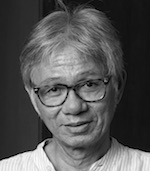
Neither poetry nor logic is Rodrigo Duterte's strong suit. So, if you see no rhyme or reason in what he says or does, don't search; there's none. He goes off on impulse, as triggered.
That's why he swings from one extreme position to the other. He vowed, for instance, to sail the West Philippine Sea bearing his nation's flag and to plant it in an island grabbed by the Chinese, only to capitulate, even kowtow, to them later. With the local communists, his relationship has been a love-hate one, as reflected in the on-again-off-again peace talks between them and the government. And to the United States, for which he has had only the worst epithets, he suddenly warms up, declaring himself "your humble friend."
If Duterte shows any consistency in anything at all, it's in his relentless and ruthless war on drugs, but that's only because it's about the only trick this pony knows. He prosecutes this war with a killer's instinct, although that instinct seems prejudiced against the poor. The characteristic illogic here is that the poor make up most, if not nearly all, of the thousands of dead in the war's first year alone, yet he had always made a dramatic case of being once a poor boy himself.
Anyway, his poor-boy story had its own limited run. He had to revise it once suitably triggered again, this time to portray himself as a scion of a landed family coming to a P3-million inheritance as a teenager more than 50 years ago.
Possibly, Duterte's new tale was inspired by a tipoff that the Office of the Ombudsman had gotten hold of bank records that lend credence to charges of unexplained wealth brought against Duterte by Senator Antonio Trillanes IV. Sure and soon enough, the tipoff proved correct; the overall deputy ombudsman, Arthur Carandang, confirmed that his and Trillanes' documents are “more or less" a match. Trillanes had asked the Ombudsman, former Supreme Court Justice Conchita Carpio-Morales, to look into the case, but she inhibited herself, being an aunt of Duterte's son-in-law, and passed the task to Carandang, who found that, indeed, Duterte had a lot of explaining to do.

If Duterte had been prescient enough to put his inheritance in 3 pieces of property in Forbes Park, the premier rich man's ghetto, in Makati, and sold now, he would have realized a billion pesos, precisely equal the amount shown to have found its way into his family's bank accounts. But Carandang's and Trillanes' documents show no such simple transactions; they show, rather, sums flowing across a network of bank accounts.
Trillanes did not say where he got his documents. In his own case, Carandang points to the Anti-Money Laundering Council, but it denies being the source. In any case, the Office of the Ombudsman says that it "stands by its word." And responding to Duterte's threat to have the office investigated for corruption, it says that it "shall not be intimidated" and that it in fact "welcomes... efforts to help it cleanse its ranks."
At any rate, the unsorted question about who provided the bank records loses much of its relevance in the glare of the damning evidence the records themselves reveal. Understandably, any anomaly involving the president – in particular a president so easily provoked to retaliate as Duterte – is most likely to disperse blamable functionaries. As it happens, the chairman of the Anti-Money Laundering Council is Duterte's recent appointee as Central Bank governor.
To be sure, taking on the president – any president – under any circumstances is sensitive business, to say the least. For one thing, the president cannot be sued while in office. He may be impeached by the House of Representatives and tried by the Senate, but the prospect is an improbable one for Duterte since he commands a massive majority in both houses.
All that immunity, however, does not shield him from being investigated and revealed for wrongdoing. In fact, with his net worth, he is required by law to be truthful and transparent, and that's precisely the duty Trillanes and Carandang are trying to get Duterte to fulfill, so that the people's right to know may be satisfied. – Rappler.com